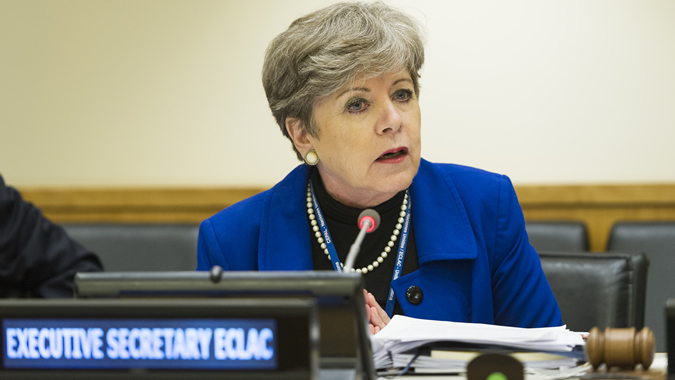Criteria for Access to Concessional Financing Must Change to Support Caribbean Countries with their Reconstruction
ECLAC’s debt relief proposal for the countries most affected by recent hurricanes was presented by Alicia Bárcena, the organization’s Executive Secretary, at a high-level ECOSOC meeting in New York.

In the last six months, Caribbean island states have suffered the consequences of the worst hurricane season this century with more than 102 deaths and territories that were completely devastated, such as Barbuda, Anguilla, Saint Martin, Dominica, Cuba and Puerto Rico, among others. To help in their reconstruction and future adaptation to natural disasters, the criteria enabling them to access financing must be changed, according to the senior international officials gathered in New York at a special session of the United Nations Economic and Social Council (ECOSOC), convened to address the effects of the latest climate phenomena.
During the special meeting, entitled Aftermath of recent hurricanes: Achieving a risk-informed and resilient 2030 Agenda, the heads of various United Nations bodies and the World Bank as well as representatives of affected countries discussed the economic, social and environmental impacts of the natural disasters and how they may affect countries’ capacities to implement the 2030 Agenda for Sustainable Development and its goals (SDGs).
The event was led by Marie Chatardová, President of ECOSOC; Miroslav Lajčák, President of the UN General Assembly; and Amina J. Mohamed, Deputy Secretary-General of the global organization.
On a panel moderated by The New York Times journalist Lisa Friedman, the Executive Secretary of the Economic Commission for Latin America and the Caribbean (ECLAC), Alicia Bárcena, spoke of the great vulnerabilities that Caribbean countries face (both economic and environmental, stemming from their small size and their degree of exposure to external influences beyond their control) in addition to their fragile fiscal situation, since on average their debt levels exceed 70% of their Gross Domestic Product (GDP).
“Despite these vulnerabilities, which are compounded by the fact that 70% of the population lives in coastal areas lying just 10 meters above sea level, the majority of Caribbean nations are classified as ‘middle income countries,’ which complicates their access to financing for development. It is urgent that the criteria be changed for obtaining concessionary funds that can help in the reconstruction of their economies,” Bárcena said.
During the meeting, ECLAC’s most senior representative recalled the organization’s proposal presented some months ago to ease the Caribbean’s debt burden, which currently amounts to $52 billion dollars. This initiative was widely embraced by other members of the panel as well as by the countries representatives who participated in the debate.
Bárcena explained that the proposal calls for creating a resilience fund for climate change adaptation that involves the use of resources from the Green Climate Fund to finance projects. “We have identified a portfolio of adaptation projects that can be executed with these resources, but for that to happen it is fundamental that countries have access to concessional financing, despite being categorized as middle income nations,” she emphasized.
“This initiative has already been presented to the World Bank, the International Monetary Fund (IMF) and to other bodies, and we believe that the resilience fund must be managed by institutions such as the Caribbean Development Bank, or the Inter-American Development Bank (IDB), or the Green Climate Fund, among others … We cannot continue asphyxiating the Caribbean regarding access to the resources that it needs. The financing problem must be addressed collectively by the international community,” Bárcena sustained.
ECLAC’s Executive Secretary also insisted that the 2030 Agenda is precisely the best tool available to ensure this issue remains a priority in global forums. “The Caribbean needs long term low cost financing to achieve the various SDG goals, but the fiscal space has narrowed considerably given the high cost of public debt servicing,” she explained. She added that the voluntary national reports on follow-up to the Agenda that several Caribbean countries are presenting are proof of their ability to adapt to the goals of sustainable development. “The Caribbean must remain a top priority at a regional and global level,” she said.
Bárcena also announced that ECLAC is already working with several Caribbean nations (Anguilla, the Bahamas, the British Virgin Islands, Saint Martin and the Turks and Caicos Islands) on evaluating the damage caused by the latest hurricanes, utilizing its Damage and Loss Assessment (DALA) methodology.
At the ECOSOC meeting, the Assistant Secretary-General for Human and Social Development and representative of the Caribbean Community (CARICOM), Douglas Slater, made a special presentation about the effects of natural disasters in the Caribbean, Mexico and other nations in Central America. Other panelists participating in the debate included Robert Glasser, Special Representative of the Secretary-General for Disaster Risk Reduction (UNISDR); Ursula Mueller, Assistant Secretary-General for Humanitarian Affairs and Deputy Emergency Relief Coordinator of the Office for the Coordination of Humanitarian Affairs (OCHA); Jessica Faieta, Regional Director for Latin America and the Caribbean at the United Nations Development Programme (UNDP); and Francis Ghesquiere, Head of the Global Facility for Disaster Reduction and Recovery (GFDRR) of the World Bank Group.
Subregional headquarter(s) and office(s)
Country(ies)
- Caribbean
- Latin America and the Caribbean
Contact
Public Information Unit
- prensa@cepal.org
- (56 2) 2210 2040
